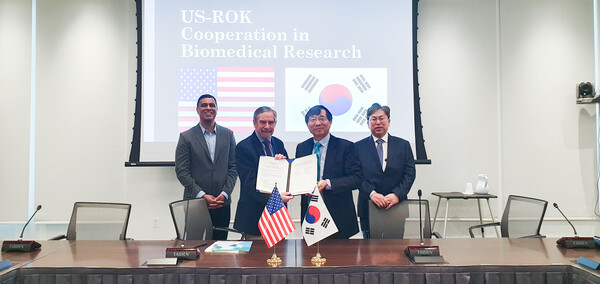The National Cancer Center (NCC) of Korea and the U.S. National Cancer Institute (NCI) signed a memorandum of understanding at NCI's headquarters in Bethesda, Maryland, on Wednesday (local time) to expand collaboration for cancer research between the two institutions.

According to the NCC, this agreement is an extension of a previous deal where both institutions committed to promoting bilateral cooperation in advanced cancer treatment and cancer research. The initial agreement was made during the visit of U.S. President Joe Biden to Korea in May 2022.
Since signing an MOU for comprehensive research collaboration in cancer genomics in 2011, NCC and NCI have continued close interaction and cooperation, including signing an MOU for collaboration in the field of cancer proteogenomics in 2019.
Under the latest MOU, the two cancer centers will expand and strengthen their existing research collaboration centered on cancer proteogenomics to a comprehensive research collaboration covering the entire treatment cycle of cancer, including cancer prevention, early diagnosis, treatment, and management of cancer survivors.
NCC and NCI also plan to expand clinical research and translational research in the field of advanced precision medicine based on cancer protein genomics, strengthen joint research in the field of advanced biotechnology, including the development of cell therapy technologies, and promote personnel exchanges between the two institutions, and hold joint conferences.
“The signing of this agreement has laid the foundation for a comprehensive research collaboration that goes beyond cancer proteogenomic research to strengthen capabilities in the entire cancer treatment cycle, from cancer prevention to cancer survivor care,” NCC President Seo Hong-gwan said. “Through close cooperation, the two institutions will explore ways to improve the quality of life of cancer patients and lead cancer research and development on advanced cancer diagnostics and treatments.”

